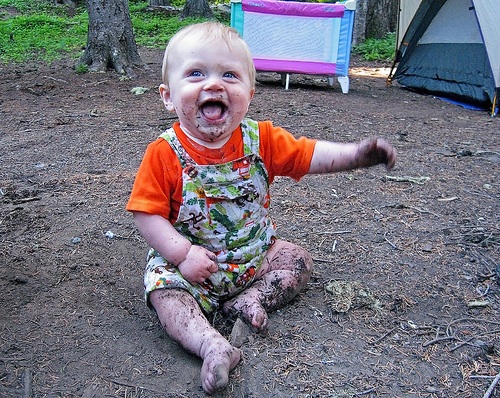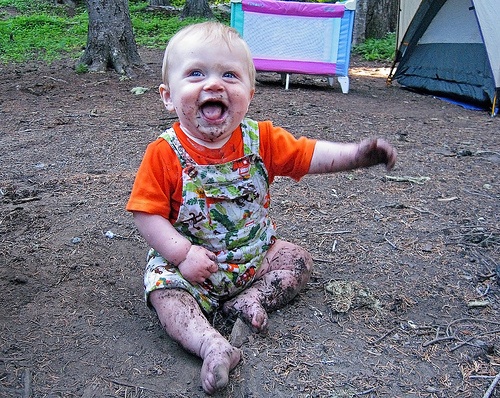 Photo: pfly via FlickrDearests, with yesterday’s Clorox wipes letter on my mind, I was intrigued to read the following headline in today’s Wall Street Journal: Can Dirt Do a Little Good?
Photo: pfly via FlickrDearests, with yesterday’s Clorox wipes letter on my mind, I was intrigued to read the following headline in today’s Wall Street Journal: Can Dirt Do a Little Good?
The story talks about the new film Babies, a Focus feature following the first year of life for four babies living in Namibia, Mongolia, Tokyo, and San Francisco, and the varying standards of hygiene in these kids’ lives. The flick doesn’t even mention hygiene, per se, but it brings up an interesting question, as posed by the WSJ piece and seemingly enforced by the reader question about overcleaning in yesterday’s column: Are we too clean?
On a small family farm in Mongolia, a rooster struts around little Bayar’s bed, a goat drinks from his bathwater and livestock serve as babysitters.
By contrast, Mari, growing up in high-rise, high-tech Tokyo, and Hattie, whose doting parents live a “green” lifestyle in San Francisco, both have modern conveniences and sanitation.
Statistically, Mari and Hattie are healthier. Some 42 out of 1,000 children in Namibia, and 41 out of 1,000 in Mongolia die before their 5th birthday; compared with only 8 in 1,000 in the U.S. and only 4 in Japan.
Yet the upscale urban infants are at higher risk for some health problems—including allergies, asthma and autoimmune diseases like Type 1 diabetes, multiple sclerosis and inflammatory bowel disease—than the babies in the rural developing world.
Obviously, we in the developed world get the way better deal—allergies instead of a far-too-early demise—but is our obsession with cleanliness (Clorox wipes, hand sanitizers, antibacterial soap, etc.) what’s causing an increase in allergies and autoimmune diseases? This article raises some compelling questions.
But during the regular flu season (or the swine flu craze of ’09/’10), you’d be hard pressed to find someone without hand sanitizer at the ready or sneezing into their elbows like the CDC taught us. And with good reason, as these illnesses are highly contagious. However, I think we may have taken our anal-retentive nature too far.
Many experts advise common sense. “We don’t want to say to children, ‘OK, play by the dirty river bank and catch whatever you can,'” says Dr. [Joel] Weinstock, [chief of gastroenterology/heptology at Tufts Medical Center in Boston]. “But we can say there’s nothing wrong with kids playing in the dirt. They don’t have to live in total sanitation, and they won’t die from eating something off the floor. It’s probably more healthy than not.”
Excuse me while I go after the grape I dropped at lunch.


